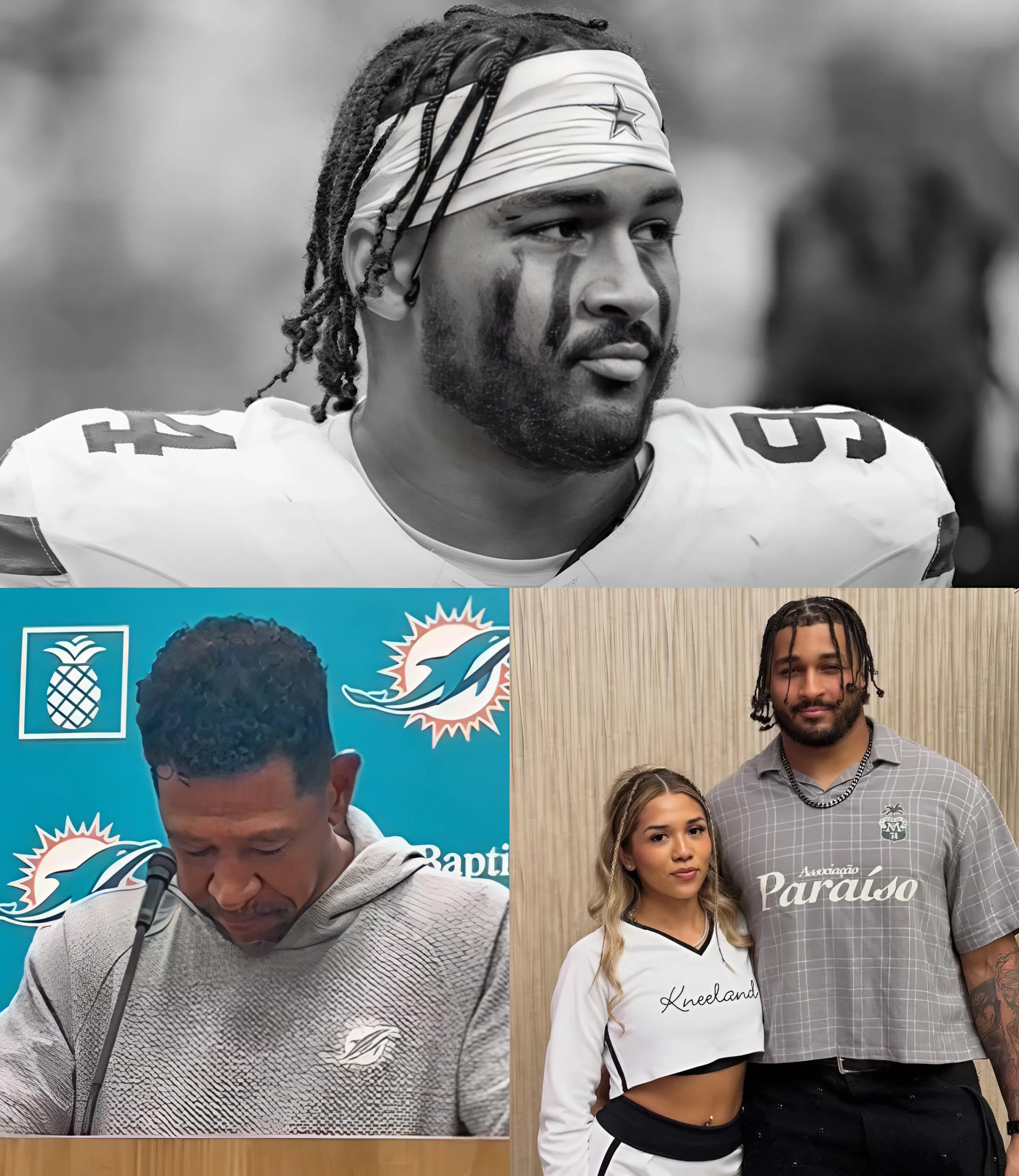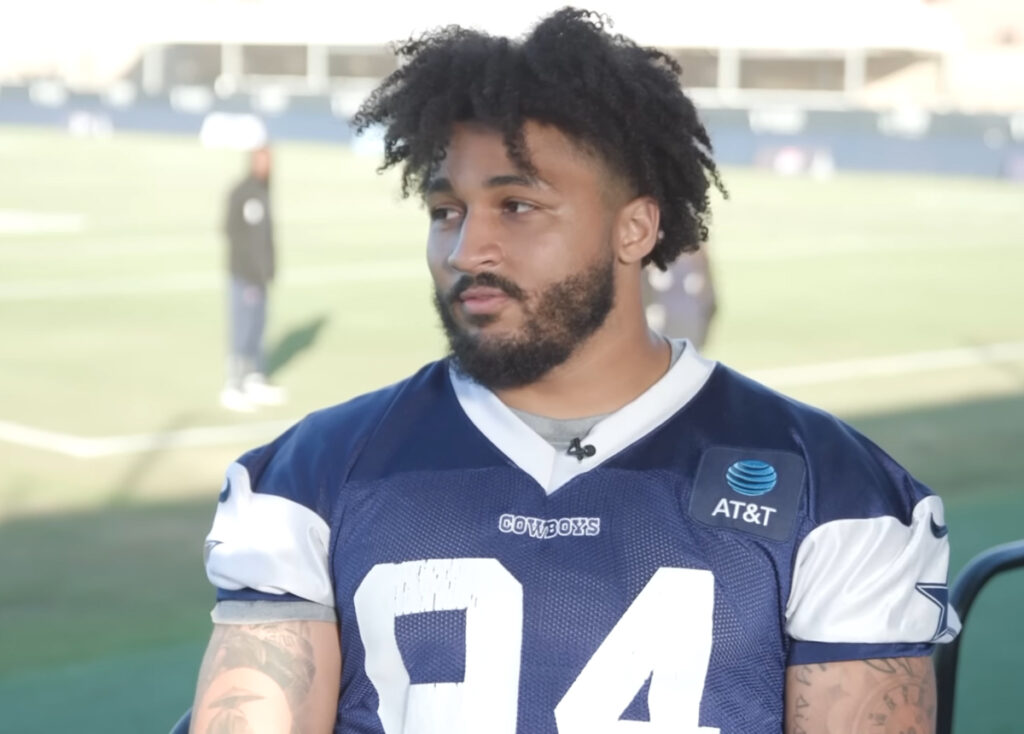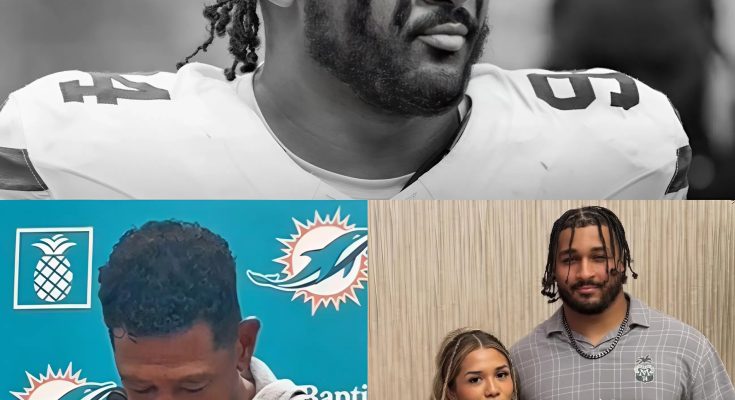It was supposed to be a normal media day at The Star, the Dallas Cowboys’ training facility. Cameras were set up, microphones angled toward the podium, and reporters expected the usual midweek routine — a few strategic answers, some locker-room banter, nothing out of the ordinary.
But what unfolded was something no one was prepared for.
When Dak Prescott walked in, his eyes told a story long before he said a word. There was no smile, no leader’s bravado, none of the calm confidence fans have come to expect from the Cowboys’ quarterback. Instead, he carried a folded piece of paper in his hand — a paper that trembled slightly as he gripped it.
“This isn’t about football today,” he began, his voice soft and uneven. “It’s about family. It’s about Marshawn.”
The room went silent.

The Final Text That Shattered Dallas
Prescott took a long pause before reading. The silence stretched, heavy and suffocating, until he finally whispered the words that have since echoed across the NFL:
“You told me once that football doesn’t last forever. But brotherhood does. I just wanted to thank you — for believing in me when I didn’t believe in myself.”
It was the last message Marshawn Kneeland ever sent.
Just hours later, the 23-year-old defensive end was gone — his life cut short in a tragedy that stunned both teammates and fans.
For Prescott, that text wasn’t just a goodbye. It was a cry from a man who had spent his last few days fighting invisible battles behind the armor of a smile.
“I keep reading it over and over,” Dak said, his voice cracking. “It’s not just a message. It’s a reminder — that sometimes, we have no idea what someone’s carrying inside.”
The Instagram Post That Haunts Everyone
What makes the loss even more haunting is that Kneeland’s final public message — an Instagram post — had gone viral just hours before his death.
The photo was simple: Kneeland, sitting quietly in the locker room, helmet by his side, eyes distant. The caption read:
“Sometimes the battle’s not on the field.”
At first, fans took it as typical athlete motivation — another reminder of mental toughness. But in hindsight, those seven words have become devastatingly prophetic.
By dawn, that post had transformed from inspiration to elegy, leaving fans reeling with questions that have no easy answers.
Inside the Locker Room: A Family in Mourning
In the days that followed, the Cowboys’ locker room — usually a mix of swagger, music, and noise — fell into an unnatural quiet. The laughter was gone. The energy evaporated.

Micah Parsons, one of Kneeland’s closest friends, reportedly walked out of the team’s meeting room mid-prayer. “I couldn’t breathe,” he later admitted on social media. “I kept waiting for him to walk in, clowning around like always.”
CeeDee Lamb was seen sitting in his locker for nearly an hour after practice, scrolling through old text messages. “We all thought we had time,” he said softly to reporters.
Even head coach Mike McCarthy — a man who rarely shows emotion in public — choked up when addressing the team. “Marshawn played every snap like it was a privilege,” McCarthy said. “And maybe that’s how we should all live — with that same fire.”
The Hidden Pressure of Being “Strong”
As tributes poured in, one painful truth began to surface: Marshawn Kneeland’s story wasn’t just about one player’s death — it was about what the culture of silence in sports can do to young men who are told to be invincible.
Football, perhaps more than any sport, demands emotional toughness. Players are trained to take hits, suppress pain, and keep moving. Vulnerability is often mistaken for weakness.
Dak Prescott, who has been open about his own mental health struggles — including the loss of his brother Jace to suicide in 2020 — didn’t shy away from the uncomfortable truth.
“People see the helmets, the lights, the touchdowns,” Prescott said. “What they don’t see is the loneliness, the pressure, the weight we carry when the stadium goes dark.”
He paused, visibly fighting back tears. “We have to talk about it. We have to. Because pretending we’re okay doesn’t make it true.”
A Brotherhood Tested
For teammates, Kneeland wasn’t just a rookie learning the ropes — he was the kid everyone loved. Known for his humor, humility, and relentless work ethic, he was often the first to arrive and the last to leave.
“He’d give you the shirt off his back,” said veteran defensive lineman DeMarcus Lawrence. “He had this energy — man, you couldn’t help but smile around him.”
That’s what makes his death so incomprehensible. The same person who lifted others up was silently drowning.

And that paradox — the smiling face masking silent pain — is what has shaken the Cowboys’ locker room to its core.
Beyond the Field: The Ripple Through America
Within hours of Prescott’s emotional press conference, fans across the country began lighting candles and leaving flowers outside AT&T Stadium. Jerseys bearing Kneeland’s number — 91 — lined the gates, along with handwritten notes and photos.
One note, left by a child, read simply:
“We love you, Marshawn. Thank you for making football fun.”
NFL teams across the league held moments of silence before practice. Even opponents — from the Eagles to the 49ers — posted tributes online.
The Detroit Lions, Kneeland’s alma mater, shared a photo of him with the caption:
“Once a Lion, always a Lion. Rest easy, #91.”
In a rare show of unity, rival fans from across the NFL joined Cowboys Nation in mourning. It wasn’t about colors or competition anymore. It was about humanity.
A League Forced to Reflect
Kneeland’s passing has reignited a difficult but necessary conversation in the NFL — about the mental health of players who are treated like gladiators but bleed like anyone else.
The league has poured millions into physical safety reforms: concussion protocols, helmet technology, recovery programs. But emotional safety remains largely in the shadows.
As one analyst wrote in Sports Illustrated:
“The NFL protects bodies better than it protects hearts.”
Prescott’s heartfelt message has now sparked calls for change — not in rulebooks, but in locker rooms. He’s urging teams to build real mental health infrastructure: counselors on call, open conversations, and a shift in the culture that punishes vulnerability.
“Checking in on your brother shouldn’t wait for a tragedy,” he said. “We’ve got to make it normal — to ask, to talk, to care.”
The Legacy of Marshawn Kneeland
As the Cowboys prepare for their next game, they’ll take the field wearing a small patch on their helmets: MK91.
It’s a simple symbol — but to them, it carries the weight of an entire story.
Dak Prescott described it best:
“That patch isn’t just for Marshawn. It’s for every player who’s ever felt alone in this game. It’s for the ones still fighting their battles in silence.”
Behind the scenes, teammates have also started a new initiative — “The Brotherhood Project” — a mental health fund created in Kneeland’s memory to provide resources and counseling for young athletes.

“It’s what he would’ve wanted,” said Parsons. “He cared about people more than anything. Now it’s our turn to care for each other.”
A Quarterback’s Final Words
At the end of the press conference, Prescott folded the letter back into his pocket. For a moment, he looked straight at the cameras, his voice steady but full of grief.
“He thanked me for believing in him,” Dak said quietly. “But what he didn’t know was — he made me believe again. In life. In people. In why this game matters.”
He took a deep breath, his eyes glistening.
“From now on, every snap, every throw, every win — it’s for Marshawn.”
And then he walked away, leaving behind a room full of reporters who, for once, didn’t rush to ask questions.
Because in that moment, everyone understood something far greater than football:
That strength isn’t found in hiding pain — it’s found in daring to share it.
And Marshawn Kneeland, in his final message, had done just that.



